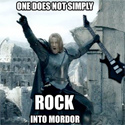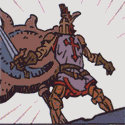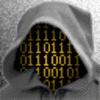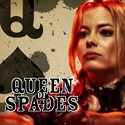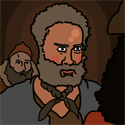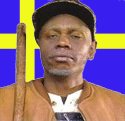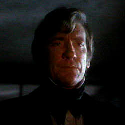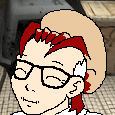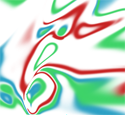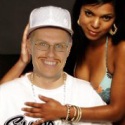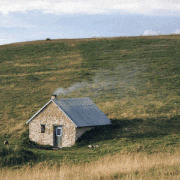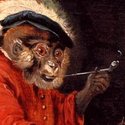|
I've been considering American Gods for a while now, I'm glad to see some traffic about it in this thread. I just finished Dune Messiah. At first, I didn't find the story particularly gripping. All of the main characters were very interesting, but I found it difficult to "relate" to. They are all just bizarre--in an admittedly cool way, but no one grabbed me. However, as the end of the book ramped up to climax, I was stunned to find myself "on the edge of my seat" right up until the finish. Then, when Maud'Dib died... I was genuinely moved! I didn't think I was attached to his estranged personality at all. I was pleasantly surprised. Where Dune had be absolutely hooked for the about the last third of the book, Dune Messiah had me gripped for about a quarter or a fifth of the end of the book. But the end was definitely solid enough to launch me right into Children of Dune.
|
|
|
|

|
| # ? May 14, 2024 06:27 |
|
The Last Continent, Terry Pratchett Wizards in
|
|
|
|
A friend lent me, as a joke, George E. Dawson's The Right of the Child to Be Well Born, a book on eugenics written in 1912 by a professor of psychology at the "Hartford School of Religious Pedagogy". It's pretty interesting to see how the time period and his situation shapes his entire thought, even when phrased in a pseudo-scientific standpoint. His perceived role of religion in life and children is quite plain, and I don't think that even modern devotees would find the type of bigoted light he shines on those subjects comfortable. For example (and the third quote is my favorite): quote:It may, therefore be said that all men and women, at their best, are instinctively eugenicists. How else, indeed, could mankind have built up the measure of vitality, wisdom, and goodness of heart that it has achieved? quote:While the method of transmission of qualities from parent to offspring is not yet fully understood, and while scientists differ as to whether or not acquired qualities may be inherited, there is no difference of opinion regarding the really vital aspects of heredity. Thus all will agree that the qualities human beings are born with, may be transmitted to their offspring. Moreover, all will agree that the qualities acquired after birth, in so far as they affect the vitality of the individual, may affect the vitality of his offspring through the germinal elements. So that, either in the matter of physical deformities or disease, or in that of mental disease, the case is clear that if the specific disability is not transmitted, nevertheless a condition of diminished vitality may be transmitted which will favor the outcropping of the same disability on some other. Any thing, in short, that is a vital factor in the life of a parent, such as the various physical organs and mental traits, may, if modified through disease or misuse of any kind, become, directly or indirectly, a vital factor in the life of the child. quote:On the negative side of moral character an equally illuminating light is shed. The resistance to evil of every description becomes at once a much larger task than the conservation of individual welfare. Howbeit, it becomes a vastly more inspiring and hopeful task in proportion as its ends are larger. Organic appetites are thus to be regulated and used in the interest of posterity, no less than in the interest of the individual life. The supreme temptations of the sexual life are to be met and overcome by young men and young women with eh vision of parenthood before them, and the relation of the exercise of sexual functions to healthy and efficient children that may some time be born to them. No more powerfully inhibiting impulse could be invoked than that associated with the pride of virile fatherhood and chaste and beautiful motherhood. Similar conditions hold true of other moral temptations. What man or woman would practice any vice if they could see their own lives as the media of transmission in racial progress? What man or woman could abuse their bodies or their minds, in any way whatsoever, if they saw in every violation of the moral law which they committed, the possible disease or death of that portion of the human race that may be numbered among their posterity? Bhodi fucked around with this message at 18:41 on Jan 29, 2008 |
|
|
|
Understanding Terror Networks by Marc Sageman. He wants to apply social science method to understanding why and how individuals become terrorists, by utilzing empirical analysis and the like. He does the social network analysis piece of it well and writes a decent qualitative analysis. He does't really list his empirical data or analysis that well and he doesn't really develop hypotheses or models and test his data against it. All in all, it was fairly insightful, but it didn't really deliver as a social science product, relying too much on qualitative instead of quantitative.
|
|
|
|
Finished The Terror by Dan Simmons last night. I'd read elsewhere from other reviews that the book was repetitive and boring, but I couldn't disagree more. I was absolutely hooked from the first page to the last. It's a bit of a doorstop, but I found that it flew by pretty quickly. It's a fictional historical account of the real-life failed Franklin Expedition to seek out the Northwest Passage in the Arctic, but with a terrible, toothy twist. I'm curious about Hyperion, but I don't typically like reading back to back books by the same author (I burn out easily), so up next is The Adventures of Kavalier and Clay by Michael Chabon. I've had it sitting on my shelf for a while, and I've heard it's excellent, so I should probably get my rear end in gear. tonytheshoes fucked around with this message at 01:07 on Jan 30, 2008 |
|
|
|
Just finished The Transmigration of Timothy Archer by Phillip K Dick. Not exactly what I was expecting, but I found it immensely illuminating in regards to his personal life. About to start Portrait of the Artist as a Young Man by James Joyce.
|
|
|
|
Read a couple of other Robert Harris books - Imperium and Pompeii, both of which I enjoyed quite a bit. Looking forward to reading his other stuff (I've got Archangel lined up to read soon as well).
|
|
|
|
I just finished Freakanomics. It read like a collection of loosely related NY Times articles. The authors' approach wasn't as exciting or revolutionary as it was forecasted in the reviews. At least they acknowledged that they were also speculative. It's still a very interesting read.
|
|
|
|
I just finished Slaughterhouse Five and really enjoyed it. It's the first Vonnegut book that I've read and I'm looking forward to reading more of his works now. If anyone has a suggestion for the next one to pick up, I'm all ears.
|
|
|
|
I recently finished Written Lives by Javier Marias. It's a slightly irreverent book full of little bios on famous authors, and a few not so famous. Mostly it focuses on the authors' personal lives which, on the whole, were entertainingly weird, like James Joyce's penchant for writing pornographic letters to his wife. 
|
|
|
|
I just finished Footfall by Larry Niven & Jerry Pournelle. I got it from the library and didn't think it was gonna be such a long read. I was shocked when I saw just how big the book was! I really liked the story as I'm a big fan of alien invasion stories. I especially liked the parts where the Earth was being attacked, etc. I had mixed feelings about some of the characters (Jenny, Harry, the sci fi writers) as I didn't think they were as great as the authors evidently thought (too much hero worship). They had their good moments but lacked basic human flaws. Really liked Roger Brooks. I also wish the ending had been a little more exciting. Still really enjoyable and had me on the edge of my seat at times. Only one thing really, really bothered me: God, why baby elephants? Most of the time I couldn't even concentrate cause I just kept thinking, "really? Elephants? Really?" Really wished the aliens had had a more threatening, or interesting, appearance.
|
|
|
|
I just finished The Ruins by Scott Smith. It was an interesting concept that could translate well to the movie. I couldn't stop thinking of Little Shop of Horrors once they get to the Ruins.
|
|
|
|
I just finished Snow by Orhan Pamuk. I know nothing about Turkey other than what I read in the news so it was interesting in that sense to get a more personal view of the conflicts within a Turkish city. Given that one of my interests is Japanese literature I'm at least somewhat familiar with the social struggles of a culture that half wants to "westernize" and half wants to retain traditional significance. The part I had trouble, though, was the black and white line between being religious and not being religious. Basically all the characters were either Islamist extremists, or they were atheists. Westerners were all labeled as Atheists and anyone who they thought acted overly Western was automatically considered an atheis. Anyone who even remotely questioned anything about the Koran was considered an atheist. Overall it was interesting to read about that kind of mindset. I couldn't help but feel like it was a more primitive way of thinking and, now that I type that, I feel a bit of chagrine because the book is fully aware that most western readers would feel that and actually calls people like me on it. I would really recommend the book, though. It had a good mixture of despair and humor. I've just started Dostoevsky's The Brother's Karamazov. I'm not very far into it but I'm enjoying the style and manner of the narrator. Even though he uses more commas than I've ever seen in a sentence it's still easy to follow. My only problem is that he uses so few paragraph breaks so it's hard to read in short bursts like on the metro. z0331 fucked around with this message at 22:39 on Feb 1, 2008 |
|
|
|
The Alexander Cipher by Will Adams. I'm pretty sure after reading it that wasn't the author's original title; the titular cipher is mentioned maybe twice in the whole book (I remember seeing it written in that way for the first time and imagining Mike and Bots yelling "We have title sign!") and plays a fairly minimal part in the story. But hey - Cipher, Code; Alexander, Da Vinci... all the same thing, right? Marketing, ain't it great? Plot: various groups of people with their own agendas are searching for the burial site of Alexander the Great in Egypt. It started off pretty slowly, with characters delivering lots and lots of historical exposition about Alexander (including an Alexander-era prologue that makes it seem that we're going to get a two-timeline story, but which is only referred to in passing later on) that isn't really necessary for the story, but it picks up the pace as it goes on. The final quarter is basically one chase-shootout-doublecross after another. My main gripe was that four of the main characters (Knox, Gaille, Elena and Nicolas) had prior connections and a shitload of angst linking them, so them all just happening to come together over the course of the story felt forced. Another, lesser gripe was the lack of any real connection to the villain's ultimate plan, which I'm sure would be a big deal if you're Macedonian... but how many people reading this UK-published book are likely to be? The climax also reminded me a lot of the movie Enemy Of The State... Not bad overall, with a good feel for the seedy side of Egypt that certainly put me off ever actually visiting there, but I wish it had either trimmed down the historical info-dumping or spread out its delivery a bit more. Oh, and "A shot rang out." Seriously?
|
|
|
|
Too Official posted:I just finished Slaughterhouse Five and really enjoyed it. It's the first Vonnegut book that I've read and I'm looking forward to reading more of his works now. If anyone has a suggestion for the next one to pick up, I'm all ears. I read Sirens of Titan a few months ago as my first Vonnegut novel and I must say, it's pretty bad rear end.
|
|
|
|
Too Official posted:I just finished Slaughterhouse Five and really enjoyed it. It's the first Vonnegut book that I've read and I'm looking forward to reading more of his works now. If anyone has a suggestion for the next one to pick up, I'm all ears. Cat's Cradle is absolutely wonderful. I also greatly enjoyed Galapagos. This week finished a couple more Koontz books (it was light reading week): The Bad Place which was enjoyably hosed up, and Cold Fire which wasn't half bad either. I guess his older stuff is still pretty fun, though a couple of the newer ones I read were utter garbage. Also wrapped up the first Foundation book (Asimov), and halfway through the second.
|
|
|
|
Two nights ago, I finished reading Carl Sagan's The Demon Haunted World, a book that took me longer to read than I would've thought. This is partly because I didn't have as much time to read and partly because I kept on re-reading some of the more important sections in order to fully understand what he was trying to say. Overall, I found the book to be quite thought provoking - some sections seeming to be downright prophetic (of course, that may be more a case of me twisting the words to fit what I was searching for, who knows?) Now I am reading José Saramago's Blindness based off this forum's recommendations. Two days in and I've already read 216 pages of the book. It is fantastic.
|
|
|
|
I just finished Cry, the Beloved Country: A Story of Comfort in Desolation by Alan Parton. If any of you have an interest in South African history or even South Africa today, I couldn't recommend this book enough. It's extremely powerful and moving, and very well written. Some people I know complained of finding it very slow but I didn't at all, in fact I felt he wrote very concisely. Very cool memorable characters too.
|
|
|
|
Just finished All the King's Men by Robert Penn Warren. Absolutely spectacular, though my friend's and I have joked that it could have been called "All the King's Similes", as at least one appears on practically every page. Also, Pride and Prejudice by Jane Austen, which was really boring and I hope I never have to read anything by her again. Currently on One Hundred Years of Solitude by Gabriel Garcia Marquez and The Unbearable Lightness of Being by Milan Kundera.
|
|
|
|
National Lampoon's Doon, credited to "Ellis Weiner", but I don't really trust that to be an actual, single, author. Parody of the great sci-fi classic Dune, on the level of Mad magazine movie parodies. Fun if you like that sort of thing. Talking like Yoda there is lots, and dangerous games people play.
|
|
|
|
I just finished God Emperor of Dune and I must say that I was pleasantly surprised. Since it's so detached from the Dune trilogy, I thought it might just be a tacked on story to rake in some more dough. Alas, that was far too pessimistic. This was Herbert's way of expressing his own opinions about a wide array of topics, as well as conveying a message. Although the ending was quite abrupt, I found myself satisfied. Frank Herbert is definitely one of my favorite authors. Now I just need to find the rest of the Future History series by Robert Heinlein. That's a real bitch to track down.
|
|
|
|
I just finished Snow Crash by Stephenson and I liked it. I can see why it's been so influential and popular and pretty much everyone should read it. I didn't much care for the ending and there were certainly some bad parts but if I had a list of 20 or 25 "required reading" books, it'd make it on there. There may be a few concepts that he over promises on some concepts but again it's very good. If you've been debating picking it up, give it a shot. I recommend it. Other books I've finished since the surgery: The Newton Letter by John Banville is utter poo poo. Banville grew into his writing talent but this book features none of it and unless you really like the guy(and I do, believe me) this is probably a good avoidance book. You can use it to kill bugs if you mistakenly purchase it though. Coriolanus by Shakespeare is not part of frequent Shakespeare reading but is actually pretty cool. It's about a Roman general and it's a tragedy but if you read it take a look at how much like Romeo and Juliet it is. There is parallel after parallel to the point that I almost knew how it was going to end, aside from the obvious "it's a tragedy" part. Araby by James Joyce was another school reading, which I'm loathe to post about but this short story was actually good and I nearly went out and bought Dubliners until I remembered I owned the book already. Araby is one of Joyce's earliest works but you can already see his deep use of allusion and reference. His language is supreme here, I think it's one of the better stories in Dubliners although I'm not finished with the book so far and short stories are hard to judge. I'm pretty sure I didn't review this already but if I did, forgive me King, Queen, Knave by Nabokov which was a very good book by a great author. It reads too German, in my opinion. Nabokov was clearly settling into life in Berlin at the time and wrote the novel where most of the best parts feature Berlin prominently, which is why the ending is such a pity. I'd put it at the bottom of the "Nabokov I've Read" pile, which is something of a pity but this one may have just lost too much in translation. Being the worst Nabokov is no shame. It doesn't have the plot of Mary or Despair which doesn't require exact language in the same sense as I imagine this book would. Or maybe I'm giving him too much credit, it's entirely possible he just wrote a bad book. I recommend it if you've never read Nabokov but if you have then it's probably worth a pass. Pick up Mary instead and think about how long fantasy serie are. I'm currently a little under half way into The Defense by Nabokov. It's great so far.
|
|
|
|
Just finished Iain M. Banks' Matter, his latest science fiction book in Culture series. I remember Banks having his own megathread devoted to him but it seems to have fallen into archives which I don't have access to. For some reason I didn't like books he's written in last few years nearly as much his earlier production, but Matter was pleasant surprise again, maybe partially because of familiar setting. Now I'm reading and nearly through Anthony Beevor's Berlin:The Downfall 1945.
|
|
|
|
Brave New World Aldous Huxley I've always thought Utopian societies were very difficult settings to put in stories. It makes it rather difficult to have conflict in. Huxley did a very good job introducing the savage into his Fordian society. I liked the book, yet didn't at the same time. I thought soma was stupid and some things just didn't seem to fit. At places it read like a Dr. Seuss book. I had no trouble getting through it all, but it didn't fill me with any sense of caution like 1984 or Fahrenheit 451 did.
|
|
|
|
The Adventures of Captain Bluebear by Walter Moers, recommended earlier in the thread. The cover blurb says it's a mix of J.K. Rowling, Douglas Adams and Shel Silverstein, and this nails it. There's just a whole lot of whimsy, for lack of a better word, Zamonia is filled with interesting and genuinely funny characters. I'm looking forward to reading Rumo, the sequel following one of the minor characters from the book. It's sitting on my shelf, but I'm going to finish some smaller novels first. Thanks for the rec, goon whose name I am too lazy to look up. Then I read The Beautiful Things That Heaven Bears by Dinaw Mengetsu. It's about an Ethiopian immigrant who has been living an idle life and is watching the neighborhood, and the country, he has adopted as home move on without him. Part of why I enjoyed it so much is because it's based in DC. The author, who lives in NYC, must have spent a lot of time here. Currently reading Gentlemen of the Road by Chabon. Guess what? Great intellectual pulp fun, so far.
|
|
|
|
YancyDCjew posted:The Adventures of Captain Bluebear by Walter Moers, recommended earlier in the thread. The cover blurb says it's a mix of J.K. Rowling, Douglas Adams and Shel Silverstein, and this nails it. There's just a whole lot of whimsy, for lack of a better word, Zamonia is filled with interesting and genuinely funny characters. I'm looking forward to reading Rumo, the sequel following one of the minor characters from the book. It's sitting on my shelf, but I'm going to finish some smaller novels first. Thanks for the rec, goon whose name I am too lazy to look up. That would be me. I'm actually now reading Bluebear, it was a bitch to track down in stores. I had to hit 4 different Borders before I found it (gift certificate)
|
|
|
|
I just finished Lamb: The Gospel According to Biff, Christ's Childhood Pal by Christopher Moore. If you're not familiar with it, he basically takes a pragmatic look at the life of Christ during the the period of his life not covered by any of the New Testament books. It reminds me a lot of Douglas Adams - zany, but not too over the top. Has anyone read any of his other stuff? I also finished off Hunted Past Reason by Richard Matheson. I tried to find I am Legend but the library copy was out. I was fairly underwhelmed. It's a 'man vs man vs nature' story, and the narrative didn't feel polished to me. I'll still try out I am Legend, as it's spoken of highly, but I would pass on this one. I'm also about 100 pages shy of finishing The Road by Cormac McCarthy. I'll hop over to the thread dedicated to it for discussion, but I will say that it's been one of the most moving books I've read in quite awhile.
|
|
|
|
|
George Simenon's The Man Who Watched Trains Go By. A manager in a Dutch shipping company is financially crippled when it collapses and decides that, instead of rebuilding his life, he'd rather ditch his family and indulge his antisocial impulses. Whores are beaten or killed, the police give chase and he flees to Paris. From there the book turns into Hunger in reverse, with an increasingly bedraggled and scorned killer wandering the streets, desperate to see himself written about in the papers. Given how ultra-prolific Simenon was I guess the somewhat pulpy writing isn't too surprising, though as a whole it was definitely entertaining.
|
|
|
|
QVT posted:I just finished Snow Crash by Stephenson and I liked it. I can see why it's been so influential and popular and pretty much everyone should read it. I didn't much care for the ending and there were certainly some bad parts but if I had a list of 20 or 25 "required reading" books, it'd make it on there. There may be a few concepts that he over promises on some concepts but again it's very good. If you've been debating picking it up, give it a shot. I recommend it. re: not much caring for the ending Hey here's a long conversation while we try and kill each other on cyber motorcycles. My dad knew your dad! Surprise! Yeah, I'll say. That book is an exercise in wasted narrative potential that is bolstered by brilliant asides and ideas. I'd still say read it, though. I have been reading books about America's sacred monsters lately. The first one, Libra by Don DeLillo, tells a surprisingly factual (well, not so surprising knowing DeLillo, but digging into the history after finishing was really rewarding) fictionalized account of Lee Harvey Oswald as a frustrated loner being eased into a downward spiral by an inability to find a country and the machinations of some ex-CIA. His story through DeLillo's eyes is so human and depressing, and I'm wary of falling into the trap of actually attributing these character traits onto the historical figure as it was so believable. Just a fantastic read--one of DeLillo's strengths here is his character building and the way he gives each person an individual and fully fleshed out voice. The other sacred monster is the suburban pedophile. I just finished Lolita by Nabokov, which I'm ashamed to say I'm only reading now. It is everything that you have ever heard about it and more. I particularly liked the mad, slow, drunken dance of the ending. The fact that Nabokov makes a pedophile into a pitiable character is an accomplishment only outshined by the way he puts words on the page. As an author, he's in a constant state of play with his vocabulary. Up next is Mao II by DeLillo again, and then I'm probably going to read The Last Picture Show by Larry McMurtry or Going After Cacciato by Tim O'Brien. I've been needing a good novel about war or Texas.
|
|
|
|
I just finished The Demon Awakens by Salvatore. Yeah yeah, I know that he gets a lot of flak around here. I realise that he's not the greatest of writers and gets unnecesarrily wordy in some places. What I do love is the world and characters he creates. Part of the reason I like fantasy so much is that it's an escape from whatever is happening in my life, good or bad and is a portal somewhere else. I've found that Salvatore does it really well. If you like the Dark Elf trilogy, you'll like this too. The whole Demonwars Saga has something like 10 books or crazy like that. I'm going to pick up the next one when I get my paycheck.
|
|
|
|
LoonyLeif posted:Harry Potter and the Order of the Phoenix. I thought it was immensely slow for the first half, but the second have didn't have me bored a bit. Also, I could see why the first chapters seemed long and drawn out... The author was bringing in a lot of unusual details that would be used later. I too just finished Harry Potter and the Order of the Phoenix. I agree whole heartedly about being slow at the beginning and picking up towards the end. I think this one and the third were my favorites so far in the series. And now I have moved onto The Greatest Generation by Tom Brokaw. I got it has a gift for Christmas, and so far it is fairly interesting.
|
|
|
|
Dark Space, by Marianne De Pierres. On the whole, I enjoyed this a lot less than the Parrish Plessis series.
|
|
|
|
Qvindtar posted:I just finished Lamb: The Gospel According to Biff, Christ's Childhood Pal by Christopher Moore. If you're not familiar with it, he basically takes a pragmatic look at the life of Christ during the the period of his life not covered by any of the New Testament books. It reminds me a lot of Douglas Adams - zany, but not too over the top. Has anyone read any of his other stuff? I just finished Dirty Job, but I've been stalling on a post here. It was funny, it was totally over the top at the end (which you would see from a mile away), but it left me unsatisfied. I liked the casual voice of the narrative, but I felt like the characters were a little too self aware of their own faux hipness. Like nerds who know they are cool. And the the epilogue was a train wreck, right down to the last two sentences. But that's just me. I didn't think the book sucked, but you might like it better than I did.
|
|
|
|
Night and Day with The Clash by their road manager, Johnny Green. It's a pretty solid look at how the band functioned and did things and it gave a pretty neat inside look at the punk ideals held at the time. It jumps from band related internal dynamics and how Green functioned to keep the band moving along and motivated to the obvious band shinanigans that go on while touring or just in general. Highlights include filming a video dressed up as cartoony bank robbers and actual cops busting into the scene and a large revolving list of people associated with the bank who seem to live with them for months and then just disappear for a year then come back out of no where for more funny antecdotes. I picked it up for $10 at a used book store and I thought it was a great read.
|
|
|
|
Judge Holden posted:The other sacred monster is the suburban pedophile. I just finished Lolita by Nabokov, which I'm ashamed to say I'm only reading now. It is everything that you have ever heard about it and more. I particularly liked the mad, slow, drunken dance of the ending. The fact that Nabokov makes a pedophile into a pitiable character is an accomplishment only outshined by the way he puts words on the page. As an author, he's in a constant state of play with his vocabulary. Good choice on Lolita and since we seem to have similar tastes, I don't know how you feel about comic books but Preacher is about both war and Texas and it's very good. Especially if you like Stephenson, it's like a cyberpunk mentality cowboy comic. I wish there was an actual novel which was similar.
|
|
|
|
QVT posted:Good choice on Lolita and since we seem to have similar tastes, I don't know how you feel about comic books but Preacher is about both war and Texas and it's very good. Especially if you like Stephenson, it's like a cyberpunk mentality cowboy comic. I wish there was an actual novel which was similar. I'll get into a comic every now and then, and I'm fairly certain a friend of mine has most of that series, so recommendation duly noted!
|
|
|
|
Cat's Cradle, again for the SA book club. I read it last year, but hell it's so drat good I didn't mind.
|
|
|
|
Don Oot posted:I just finished The Ruins by Scott Smith. It was an interesting concept that could translate well to the movie. I couldn't stop thinking of Little Shop of Horrors once they get to the Ruins. I felt like the book read like a screenplay, guess what I see a few days later? A trailer for The Ruins movie coming out this summer.
|
|
|
|
I just finished Half of a Yellow Sun by Chimamanda Ngozi Adichi. The writing was extremely accessible and I really loved the character of Ugwu, a village boy who becomes the servant. It's about the war in Biafra/Nigeria, told through the eyes of a small group of friends and family. It's got a lot going for it in terms of the themes but as I say I liked it most because of the lively characters which seemed so real.
|
|
|
|

|
| # ? May 14, 2024 06:27 |
|
I just finished The Sand Pebbles by Richard McKenna. For a book that eventually got made into a Steve McQueen movie I was very surprised by the depth of this book. McKenna does an excellent job of portraying China in transition, told from the points of view of the sailors on the USS San Pablo and from the missionaries at China Light, people whose world is literally shattered. The first part of the book focuses on the protagonist, Jake Holman, as he learns to adjust to life onboard the tiny San Pablo after having transferred from the Pacific Fleet. Everything is going to be perfect, he is going to have his own engine, his own engine room and be able to run it the way he wants to. Except that's not how it is on the San Pablo - most of the engineering work is done by coolies, cheap contract laborers who make their living by skimming off the ship's supplies. Coolies cook, clean, iron uniforms, swab the decks, maintain the engine and do all of the menial work leaving the crew to drill, and drill and drill and drill. The paper tiger of the San Pablo's small crew and it's three pound cannon is the only force guarding American interests - missionaries, factories, mines and more, this far up the Yangtze and appearances have to be maintained no matter how ultimately ineffective the reality may be. By the second part of the book the Chinese have seen through it. The armies of Chiang Kai-Shek marching under the "gearwheel" flag of the Kuomintang are marching north towards the Yangtze while Bolshevist forces are working and agitating along the northern banks of the river. At first the coolies start skimming more and more off the top, and then they abandon the ship, running overboard and swimming towards a blockade of sampans that have started to surround and harass the ship every day. China is awakening to a sense of self-identity that had been suppressed for a very long time and the men of the San Pablo are despised relics of the old China, an abused and tortured China with no sense of pride or self-worth. Perhaps one of the most difficult things for the crew to deal with is the fact that the people they are supposed to be protecting, largely missionaries, are full supporters of the Kuomintang. When the San Pablo is told to stand back and only defend American lives, not American property, it is because of the missionaries who have gone home and lobbied for American non-involvement in China. The reader feels the frustration, anger and demoralization of the crew as they are curtailed repeatedly from executing what is supposed to be their primary purpose - protection of American interests. The Chinese have also learned how to make paper tigers of their own from their Russian advisors and waste no time in churning out propaganda and sometimes outright lies about the San Pablo and their men. There is no place for the men of the San Pablo towards the end of the book – their country has for all intents and purposes abandoned them and there is no place in this new, alien China they find themselves in. One last thing I will mention is that that most readers will be sent running for a dictionary of mechanical engineering by about fifteen pages in. I learned more about steam and marine engines reading this book than I ever expected to.
|
|
|



